Propane is one of the most used fuels for all outdoor activities including grilling and campsite cooking.
Propane tanks are easily available and can be carried without much safety risks. But can propane tanks explode if not handled properly? How common is propane tank explosion?
Propane tanks are very sturdy and reliable and won’t explode under normal use. But if they are exposed to extreme heat, direct sunlight or deformation, they can leak and cause explosion.
In this article, we are going to discuss in details about propane tank explosion, how common they are, what causes them and what safety meansures you can take to minimise the risks.
How strong are propane tanks?
Most common propane cylinders and tanks are made from 3mm low alloy steel plates that are welded together at seams.
The tank or cylinder is designed to withhold the maximum gas pressure often stamped on the collar along with some other useful information.
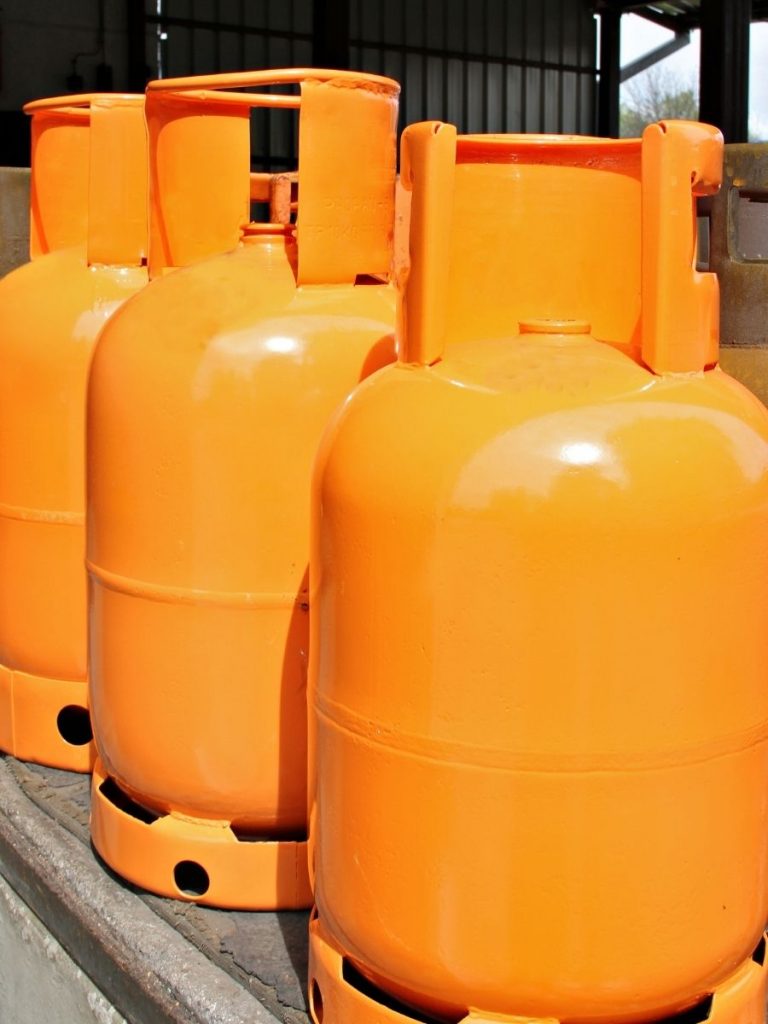
If your tank is DOT qualified less than 12 years ago, you can be sure that it is quite sturdy, reliable and safe to use under normal conditions.
However, in some cases, the tanks are exposed to humidity, water or other chemicals that results in rusting of the body or seam welds. These rustings can compromise the strength of the tank.
So if you are wondering if your propane tank is strong enough, just make sure that it is:
- DOT Qualified for use no more than 12 years ago (last inspection date stamped on the collar)
- It has no visible rusting or deformation.
- The main valve and safety valves are leak proof.
If you take care of these things, you can use your cylinder or tank without much worry. However, explosion can still accur for 2 reasons.
Can Propane Tanks Explode?
Most newer propane tanks come with a few safety features like OPD value (overfill protection valuve), safety relieve valve and pressure guage.
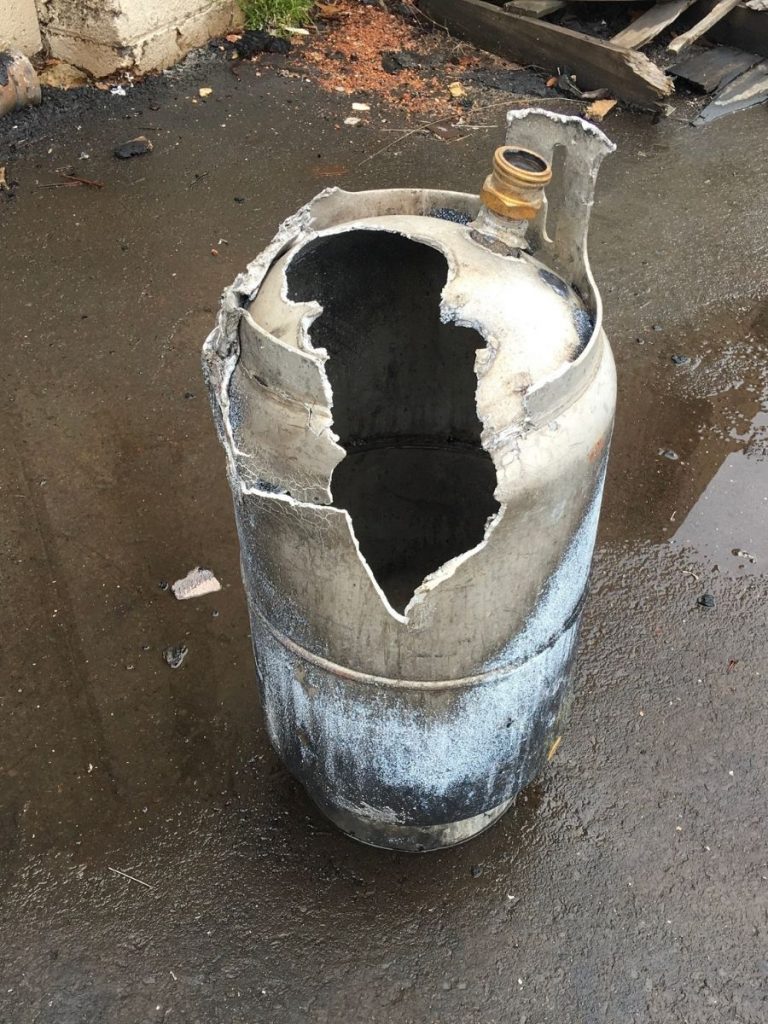
But if you are using an older tank that doesn’t have these features or have one of those smaller 20lb or 2lb propane tanks for outdoor grilling or camping, you can still use them safely.
There are two scenarios where even a fully funtional, completely safe tank can still explode.
1. Propane leak
This is the most common cause of propane explosion and is caused by improper usage of cylinder or malfunctioning valves/connectors.
If your tank is stored in a close space and for any reason, it is leaking propane, the gas will build up and explode the moment it is exposed to spark or fire.
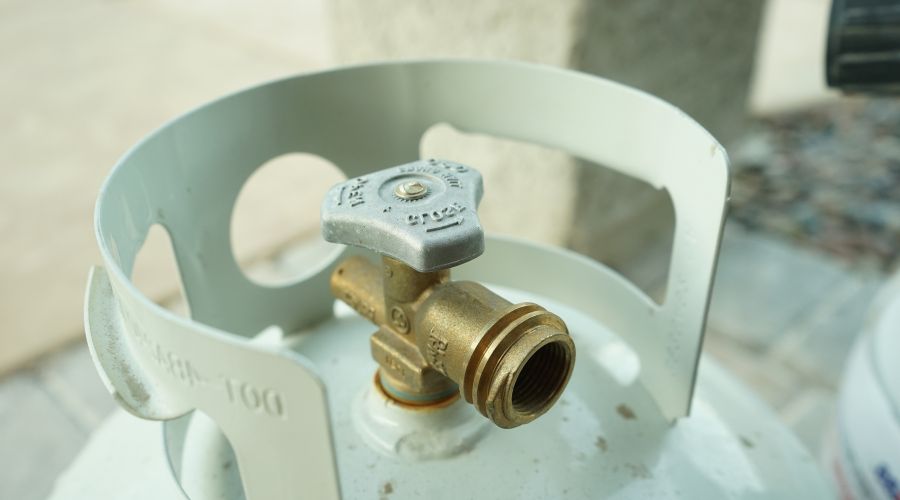
Your cylinder or tank can leak for any of the following reasons:
- Supply lines or connections are leaking
- Valves are old or worn out (rotten gasket)
- Open or partially open valve by mistake (user error)
- Corroded seams or punctured body (unlikely but possible)
If you have a leaking propane tank and is stored in a closed room or space, its a ticking time bomb. Propane is heavier than air and don’t easily dessipate.
The moment it finds a source of ignition, it will result in an explosion. The size of explosion depends on the amount of accumulated gas.
That’s why it is advisable to store propane tanks outside in a well ventilated but still covered area. If any leaks happen, it can dessipate.
Also make sure you use high quality connectors and compatible stoves as propane cannot be used with gas stoves and vice versa.
2. BLEVE explosion due to high temperature
BLEVE stands for Boiling Liquid Expanding Vapour Explosion. Bleve is a very common and dreaded term among LPG transporters and fire fighters (they pronounce it as “bleevy”)
BLEVE explosion happens when a propane tank gets heated under fire or sun and the gas pressure inside exceeds its maximum design pressure. This will result in tank rapture and subsequent explosion.
To understand the phenomenon, let me explain some basic concepts of gas physics (the mechanical engineer inside me wants to anyway)
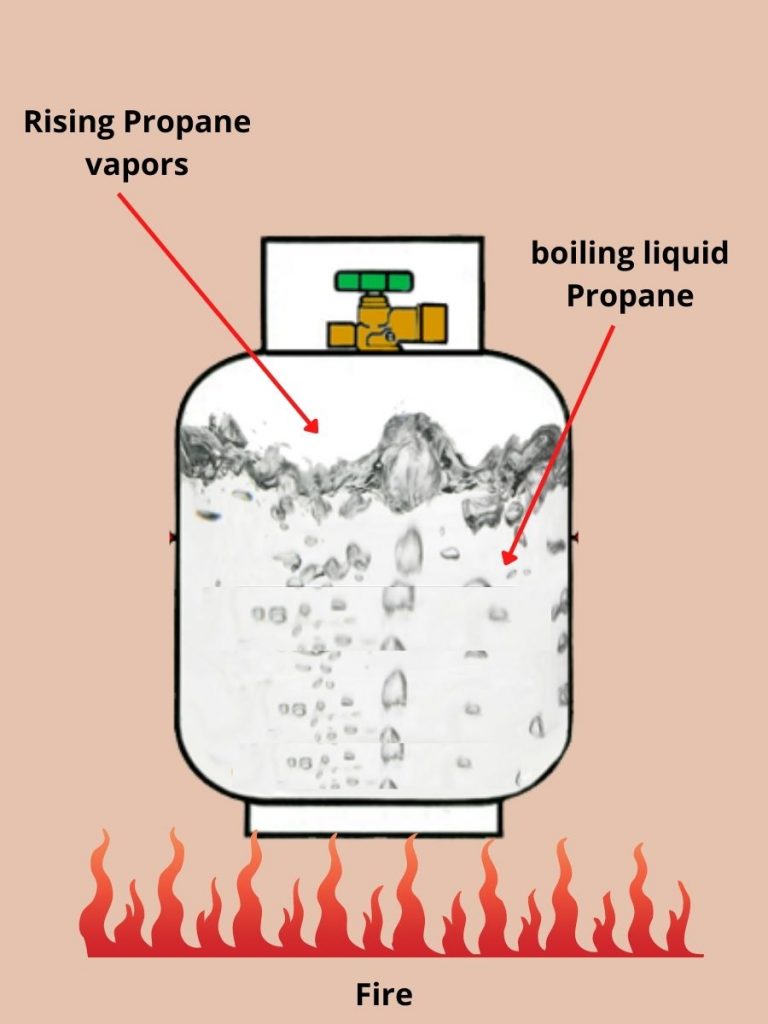
Propane is naturally a gas but under high pressure inside the tank it turns to liquid (that’s why the term Liquified Petroleum Gas – LPG is used)
When filling the tank, only 80% of the tank volume is filled with liquid propane. The remaining 20% is called “headroom” and is left for the liquid to boil and convert to gas.
Under normal temperature range, this 20% space is accupied by propane gas vapors and the pressure they exert is what we call ‘gas pressure’.
But when the same cylinder is subjected to extreme temperatures like when the cylinder is inside a burning house or vehicle or even in direct sunlight, more and more liquid is going to boil and convert to gas.
As this goes on, the pressure inside the tank rise with rising vapors. If the tank is fitted with pressure relieve valve, it will pop open at a set pressure (called MAWP – maximum allowable working pressure).
The safety valve will then start venting some of the gas to reduce the pressure inside. But the valve has a maximum flow rate to release the gas.
If the liquid inside the tank is converting to gas (due to high heat from outside) faster than the safety valve is venting, the pressure will keep on rising till it reaches the cylinder’s rapture pressure.
At this point, the tanks walls and seams are unable to contain the pressure and rapture outwards releasing the remaining liquid and gas inside.
When the pressurised gas and remaining liquid propane is exposed to the environment, it rapidly expands and in the presense of flames, catches fire instantly (check this interesting BLEVE explosion test below)
The result? A huge explosion that scatter the remains of the tanks and anything in the surrounding to miles away.
Can a propane tank explode in a car?
A car or RV with closed windows can get really hot but it is unlikely that a propane tank placed inside will explode.
However, it doens’t mean that it is safe to store a propane tank inside a closed car that is parked in direct sun. The tank might not explode but it can still leak due to rapture of safety disk on the safety valve.
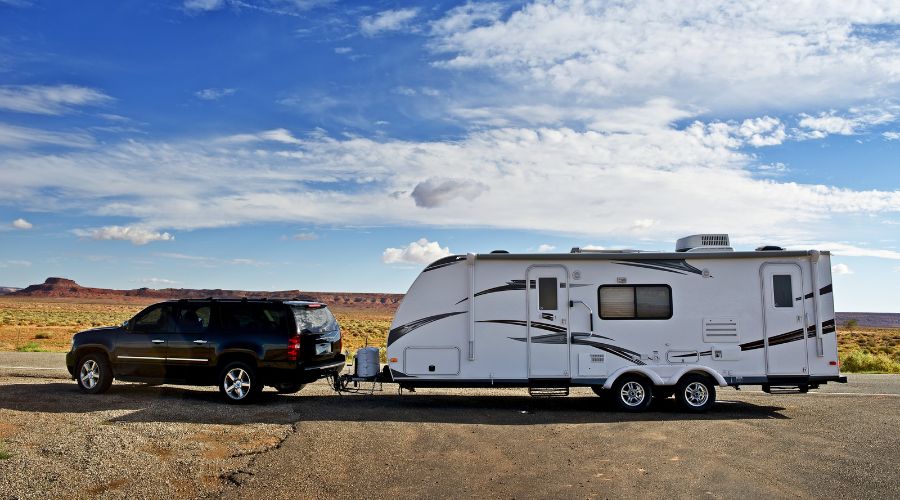
If you are going for a camping trip, make sure you carry your tank in well ventilated car or RV with windows open so that the temperature doesn’t go over safety limits.
Also avoid parking your RV or car in direct sunlight if you decide to make a stop. Find a shade to park your vehicle and leave the windows partially open for suitable ventilation.
Can a propane tank explode in the sun?
It is unlinkely for a propane tank to explode in the sun. Most propane tanks in the US are painted in white to absorbe minium heat in sun.
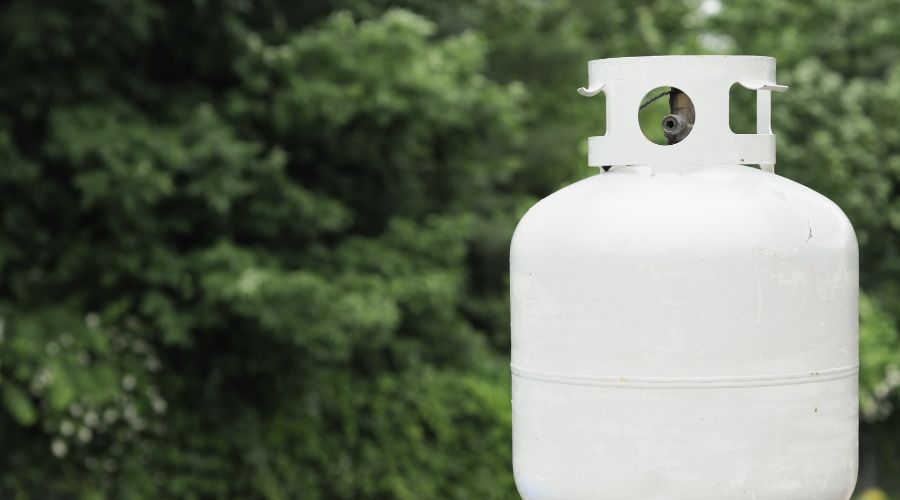
They are also fitted with safety relieve valve so even if the temperature rises, it will only vent but not explode.
Propane and other LPG tanks are only filled up to 80% and the remaing 20% headspace is left for vaporisation when the tank heats up. This is enough to keep the tank from exploding.
But again, its best practice to not leave the tank in direct sunlight for prolong period. Even if the vessel doesn’t fail catestrophically, it can still leak through safety valve due to pressure build-up.
Will a propane tank explode in hot weather?
Again its very unlikely. The hotest ambient temperature recorded is 134°F (56.7°C) in California’s Death Valley in 1913. Even that is not enough to cause propane explosion.
While desigining pressureised vessels, the highest and lowest operating temperatures are kept in mind.
Even very extreme ambient temperatures are well within the safe temperature range and propane gas tank explosion is very unlikely
For example, most pressure safety valves are set at 25 bar. Once the inside pressure reaches that limit, the valve will open and the pressure will vent. You will have to heat the tank to more than 70°C to get to 25 bar.
How to store propane tanks?
Propane tanks are pretty easy to handle and store and don’t require any special care. However, they are still highly pressurised vessels and needs some best practices.
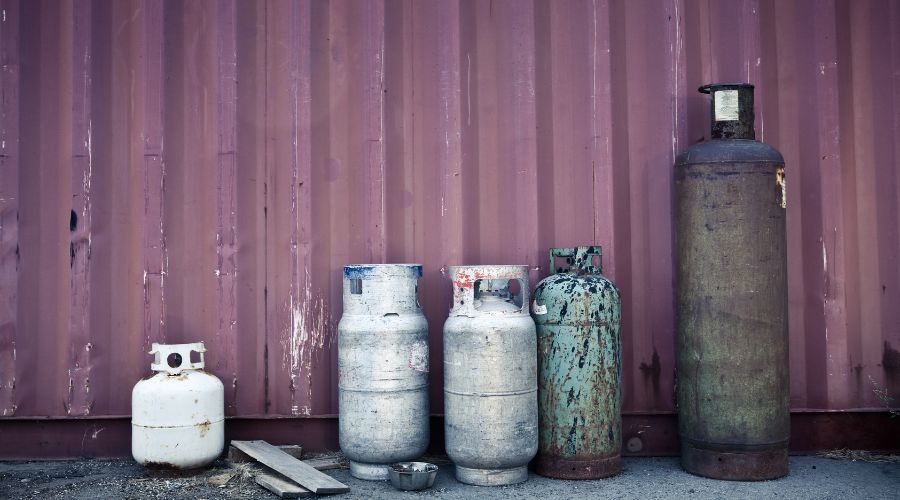
- After every use and before storing, always shut off the main valve securely.
- Use quality connectors and make sure connections are leak free before use.
- Store the propane tank on flat surface and well ventilated space.
- Keep the tank away from direct sunlight, heat and electrical appliances.
- While travelling, secure the tank with bungee rope.
- Do not leave propane tank in hot closed car.
- Always keep the tank upright else you will risk damaging the valves.
- At home, do not store the tank in closed room or guarage.
- Keep it away from damp and humid space else it will corrode.
- Use propane tank cover to protect the tank from dirt and humidity.
- Properly dispose of used and damaged propane tanks.
These are some of the best practices to store propane tanks and cylinders safely. If you want to get into more details, I have written a detailed article about properly storing propane tanks.
What to do if you smell propane leak?
Propane is naturally odorless gas and has no smell of its own. But Occupational Safety and Health Administration (OSHA) requires a special odor to be mixed with the gas to make it detectable in case of leaks.
If you smell something like rotton eggs that means your cylinder is leaking. That’s alarming and you should act immediately.
If the tank is placed in closed space like a room or kitchen, DO NOT TURN ON ANY LIGHTS. Light plugs produce sparks and that can cause fire or even explosion.
First of all, open all the doors and windows to ventillate the leaked gas and lower chances of explosion or fire.
Secondly, remove the tank from the room and place it in an open space away from heat, fire and electricity.
After that, examine the tank and see if you can fix the leak. If you are not sure what to do, call a certified professional.
Propane accidents statistics
One of the most used cases of Propane is grills and Americans loved grilling. There are more than 60 million propane grills in the US.
According to an NFPA (National Fire Prevention Association) study between 2009 and 2013, there were 7,415 grill fires in the US per year. Only 14% of them are caused by leak or explosion.
Looking at these numbers, we can confidently say that Propane tanks as fuel source are pretty safe to use both indoors and outdoors.
Conclusion
Propane is a famous fuel for camping and outdoor cooking/grilling. It’s highly portable, easily available and safe to use. Most outdoor enthusiasts prefer it over other fuel types
Propane comes in cylinders and small tanks that are very sturdy and if handled with care, posses very less chances of explosion. However, they can leak and result in fire.
If you follow the best practices and take good care of your propane tank, the chances of an explosion is 1 in 37 million according to statistics published by NFPA.
Propane tank explosion – FAQs
Can small propane tanks explode?
Small propane tanks don’t have safety valves so they are more prone to explosion than larger tanks. Small propane tanks should be kept away from direct fire, heat and sunlight.
Can 20 lb propane tank explosion happen?
20lb propane tanks used for grilling do not usually have safety valve and they too are prone to explosion if exposed to direct fire or heat.
What is propane tank explosion radius?
The radius of explosion depends on the size of the tank and amount of propane in the tanks.
Can a propane tank explode if dropped?
It is unlikely that an explosion will accur if a propane tank will drop. Propane tanks are sturdy and strong. A sudden drop might slightly deform it or at most cause a leak but an explosion is unlikely.
Do propane tanks explode when shot?
Shooting a propane tank is unlikely to cause an explosion. The tank is thick enough to bounce off most bullets. However, an armour piercing bullet might put a hole in the tank and cause a leak.
Where to store propane tank in summer?
In summers, propane tanks are slightly more prone to leaks because of high temperature. Store the propane tank in dry, well ventilated area away from direct sunlight.
How to check propane tank expiration?
As per DOT regulations, all propane tanks are subjected to inspection and requalification every 12 years. The last requalification date is stamped on the collar of the tank.
Recommended Camping Gears: I have compiled a list of my favourite camping gear in one place. The selection is based on my own personal experience using them for many years camping as well as feedback from fellow campers. Check them out on my Recommended Camping Gears page